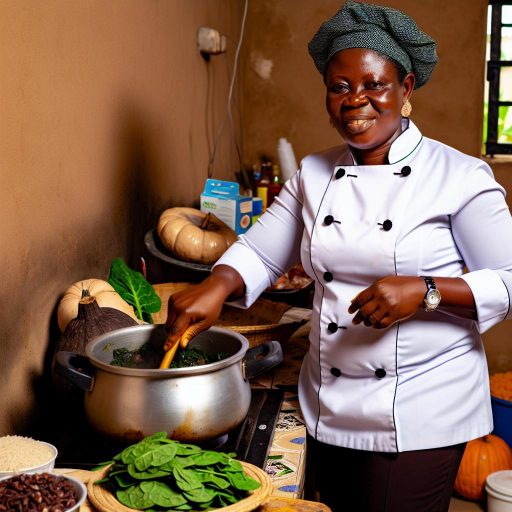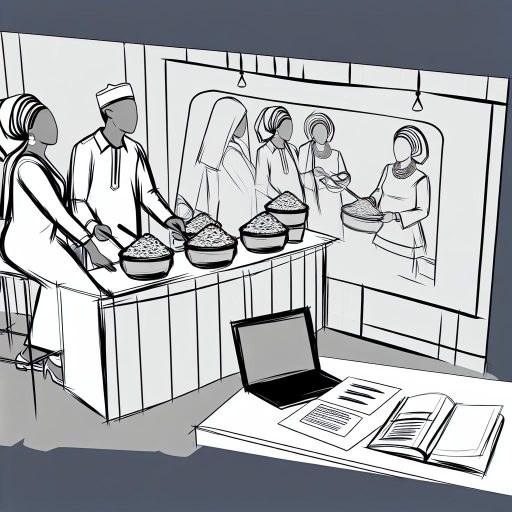Introduction to the Importance of Minerals in the Diet
Minerals play a vital role in human health and nutrition.
They are essential for various body functions and processes.
Moreover, minerals contribute to the structure of bones and teeth.
They also help in the regulation of fluid balance.
Additionally, minerals support muscle contraction and nerve function.
A balanced intake of minerals enhances overall well-being.
Yet, many people do not consume adequate amounts of these nutrients.
Factors such as diet, soil depletion, and processing may affect mineral content.
Consequently, it’s crucial to include mineral-rich foods in your daily meals.
Traditional Nigerian recipes offer a wealth of minerals that boost health.
In the following sections, we will explore three traditional recipes.
These dishes can seamlessly enhance your daily mineral intake.
Overview of Traditional Nigerian Cuisine and Its Nutritional Benefits
Traditional Nigerian cuisine offers a rich tapestry of flavors and ingredients.
This cuisine is diverse.
It reflects the country’s various ethnic groups.
Unlock the Power of Nigerian Food Minerals
Discover personalized Food Advisory tailored to boost your health or business using expert insights on Nigerian minerals.
Get StartedNigeria’s cooking often includes fresh vegetables.
It also includes legumes and grains.
These choices contribute to a balanced diet.
They provide essential nutrients.
Furthermore, traditional dishes are often naturally nutrient-dense.
Common ingredients like beans, cassava, and leafy greens contain many minerals.
The Richness of Ingredients
Nigerian cuisine utilizes a vast array of ingredients.
Each ethnic group brings unique elements to their dishes.
Staples like yam and rice form the basis of main meals.
Spices such as crayfish and pepper enhance the nutritional profile.
Additionally, the use of palm oil provides healthy fats.
Health Benefits of Traditional Dishes
Many Nigerian dishes are packed with vitamins and minerals.
For example, leafy greens are rich in iron and calcium.
Beans offer an excellent source of protein and fiber.
Captivate Your Audience with Exclusive Nigerian Food Content
Imagine your platform enriched with unique, mineral-rich Nigerian cuisine stories that no one else can offer. Let's create content that resonates deeply and sets you apart.
Get StartedMoreover, the fermentation process improves the digestibility of grains.
These practices promote overall health and wellness.
Cultural Importance of Nigerian Cuisine
Food plays a significant role in Nigerian culture and traditions.
Many recipes are passed down through generations.
Festive occasions often feature special traditional dishes.
Sharing meals strengthens community bonds and cultural identity.
Thus, exploring Nigerian cuisine offers both nutritional and cultural insights.
Jollof Rice with Seafood
Ingredient Breakdown for Minerals
Jollof rice is a flavorful dish popular in Nigeria.
It is rich in essential minerals that can boost your health.
First, we need to highlight the main ingredients.
- Long-grain parboiled rice
- Fresh seafood, such as shrimp and fish
- Tomatoes and tomato paste
- Onions
- Bell peppers
- Spices like thyme and curry powder
- Vegetable oil
Rice is a key source of carbohydrates and provides energy.
It also contains small amounts of iron and magnesium.
Seafood is packed with vitamins and beneficial minerals.
For instance, shrimp and fish are rich in zinc and iodine.
Tomatoes provide vitamin C and other antioxidants.
This combination enhances the dish’s nutritional profile.
Last, onions and bell peppers add flavor and more nutrients.
Together, these ingredients create a delicious meal.
Now, let’s move on to the preparation steps.
Preparation Steps
Start by washing the rice thoroughly.
Next, soak the rice for about 30 minutes.
Then, blend the tomatoes, onions, and bell peppers.
After that, heat oil in a large pot and pour in the blend.
Cook until the sauce thickens and the oil separates.
Next, add the soaked rice and stir well.
Then, add seafood and enough water to cook the rice.
Season with salt and spices, adjusting to taste.
Cover and let it simmer on low heat.
Cook until the rice absorbs the flavors and is tender.
Finally, fluff the rice before serving.
Enjoy your nutritious Jollof rice with seafood!
Discover More: Refreshing Nigerian Smoothies with Mineral Boosts
Nutritional Benefits of Jollof Rice
Key Minerals in Jollof Rice
Jollof rice is rich in essential minerals vital for body function.
These key minerals include potassium, iron, and magnesium.
Potassium helps regulate fluid balance and supports muscle function.
Iron is crucial for the formation of red blood cells.
Magnesium promotes bone health and aids in energy production.
How These Minerals Benefit Your Health
Incorporating potassium in your diet can lower blood pressure.
Additionally, iron prevents anemia and boosts energy levels.
Meanwhile, magnesium contributes to mental health and reduces stress.
Together, these minerals enhance overall well-being.
Other Nutritional Components
Jollof rice also offers dietary fiber that aids digestion.
This dish often includes vegetables, which provide various nutrients.
Common additions like tomatoes and bell peppers contribute antioxidants.
Furthermore, onions add flavor while offering anti-inflammatory properties.
Ways to Incorporate Jollof Rice into Your Diet
You can enjoy Jollof rice as a versatile side dish or main course.
Pair it with protein sources like chicken or fish for a balanced meal.
Experimenting with different vegetables can enhance its nutritional profile.
Jollof rice is a delicious way to increase your mineral intake.
See Related Content: Delicious Nigerian Soups Packed with Essential Minerals
Egusi Soup – How Melon Seeds Contribute to Mineral Intake
Introduction to Egusi Soup
Egusi soup is a traditional Nigerian dish rich in flavor and nutrients.
This soup features melon seeds, which are packed with minerals.
It serves as a staple food in many Nigerian households.
Benefits of Melon Seeds
Melon seeds are an excellent source of essential minerals.
They contain magnesium, zinc, and potassium, crucial for health.
These seeds contribute to heart health and bone strength.
The nutritional profile supports energy production and overall vitality.
Ingredients for Egusi Soup
- Ground egusi (melon seeds)
- Beef or goat meat
- Palm oil
- Vegetables (such as spinach or bitter leaf)
- Onions and peppers
- Seasoning cubes
Preparation Steps
Begin by boiling the meat in a pot until tender.
Next, blend onions and peppers together to form a paste.
Add palm oil to the pot and sauté the onion-pepper mixture.
Subsequently, mix in the ground egusi and stir thoroughly.
Pour in some water to create the desired soup consistency.
Add the cooked meat and let it simmer for about 10 minutes.
Finally, incorporate your chosen vegetables and cook briefly.
Serving Suggestions
Serve the egusi soup hot with pounded yam or rice.
Add a side of your favorite vegetables for added nutrients.
This dish is not only delicious but also nourishing.
Find Out More: Protein-Packed Nigerian Recipes with Essential Minerals
Understanding the Health Benefits of Egusi Soup: A Mineral Perspective
Rich Nutritional Profile
Egusi soup contains a variety of essential vitamins and minerals.
These nutrients support overall health and wellbeing.
Specifically, egusi seeds are high in magnesium, zinc, and iron.
These minerals play crucial roles in bodily functions.
Boosting Mineral Intake
Including egusi soup in your diet helps boost mineral intake.
For instance, magnesium helps maintain muscle and nerve function.
Zinc supports immune system performance and wound healing.
Iron is essential for producing red blood cells.
Supporting Healthy Skin and Hair
The high zinc content in egusi promotes healthy skin and hair.
Zinc aids in the production of collagen and new cells.
This nutrient also reduces inflammation in the body.
Enhancing Bone Health
Magnesium is vital for maintaining strong bones.
It works together with calcium to prevent bone loss.
Consuming egusi regularly helps to strengthen bone density.
Benefits for Heart Health
Egusi soup contributes to cardiovascular health.
The healthy fats in egusi seeds support heart function.
These fats can lower the risk of heart disease.
Potential Anti-Inflammatory Properties
Incorporating egusi into your meals may reduce inflammation.
This benefit stems from its rich omega-3 fatty acids.
Lower inflammation contributes to improved overall health.
Learn More: Quick and Easy Nigerian Snacks with Nutritional Benefits

Moi Moi – A Protein-Packed Dish Rich in Essential Minerals
Gather the following ingredients for a delicious moi moi.
- 2 cups of peeled black-eyed beans
- 1 medium-sized onion, chopped
- 1 red bell pepper, chopped
- 1 green bell pepper, chopped
- 1 to 2 fresh green chilies, chopped
- 1/2 cup of vegetable oil
- 1 teaspoon of salt
- 2 teaspoons of spices (e.g., curry powder)
- 2 to 3 cups of water
- Optional: boiled eggs or fish for added protein
Preparation Steps
Start by washing the black-eyed beans thoroughly.
Soak the beans in water for about two hours.
Next, drain the soaked beans and remove the skin by rubbing them together.
In a blender, combine the beans, onions, peppers, and chilies.
Blend until smooth, adding water as necessary.
Transfer the blended mixture to a mixing bowl.
Stir in the vegetable oil, salt, and spices until well combined.
If using, chop the boiled eggs or fish into small pieces.
Mix them gently into the moi moi batter.
Cooking Instructions
Prepare small containers or banana leaves for steaming.
Fill them with the moi moi batter, leaving some space at the top.
Place the filled containers in a large steaming pot.
Steam the moi moi for about 45 minutes to an hour.
Check for doneness by inserting a toothpick; it should come out clean.
Serving Suggestions for Moi Moi
Serve the moi moi warm as a side dish or main course.
Pair it with rice, plantains, or bread for a fulfilling meal.
This dish is highly nutritious and perfect for any occasion.
Enjoy the savory flavors and health benefits of this traditional recipe.
Comparative Analysis of Mineral Content in the Featured Recipes
Nutritional Highlights
Nigerian cuisine is rich in minerals essential for health.
Each featured recipe offers unique nutritional benefits.
These dishes provide a variety of vital nutrients.
It is important to understand the mineral content of each.
Mineral Content in Traditional Dishes
- Pounded Yam with Egusi Soup is a great source of protein.
- Egusi Soup also includes omega-3 fatty acids from melon seeds.
- Jollof Rice is high in vitamin C and iron from tomatoes.
- Vegetable soup, known as Efo Riro, provides fiber and various minerals.
Minerals Breakdown
Let’s explore the primary minerals found in these dishes.
- Calcium supports bone health and muscle function.
- Iron is essential for oxygen transport in the blood.
- Magnesium aids in nerve function and energy production.
- Potassium regulates fluid balance and cardiovascular health.
Insights from Recipe Mineral Comparison
Comparing the mineral data reveals interesting insights.
Pounded Yam with Egusi Soup offers significant calcium and iron content.
On the other hand, Jollof Rice excels in vitamin C, enhancing iron absorption.
Vegetable soup provides a range of minerals, supporting overall health.
Tips for Enhancing Mineral Absorption from Traditional Nigerian Dishes
Understand Nutrient Interactions
Minerals often compete for absorption in the body.
For example, calcium and iron can inhibit each other’s absorption.
To optimize intake, consume these minerals at different times.
Pair Foods Wisely
Include vitamin C rich foods with iron sources.
Foods like tomatoes or oranges enhance iron absorption.
Similarly, pairing calcium-rich foods with magnesium can be beneficial.
Focus on Cooking Techniques
Certain cooking methods can improve mineral availability.
For instance, boiling can reduce the oxalate content in vegetables.
This allows for better calcium and iron absorption.
Choose Whole Foods
Whole foods often contain more minerals than processed options.
Include leafy greens, legumes, and whole grains in your meals.
These foods provide essential nutrients and enhance overall health.
Consider Fermentation
Fermented foods improve mineral bioavailability.
Examples include traditional Nigerian foods like garri and ogi.
Fermentation breaks down anti-nutrients that inhibit absorption.
Watch for Excessive Intake of Certain Nutrients
Too much of one nutrient can hinder absorption of another.
Avoid high doses of calcium if you aim to absorb iron efficiently.
Balance your diet with a variety of foods for best results.
Importance of Staying Hydrated
Drinking enough water is crucial for digestion.
Hydration helps transport nutrients effectively in the body.
Adequate fluid intake can enhance mineral absorption as well.
Embracing Traditional Recipes to Meet Daily Mineral Needs
Benefits of Traditional Nigerian Recipes
Traditional Nigerian recipes offer a rich source of essential minerals.
These dishes incorporate local ingredients that enhance nutrition.
Furthermore, they provide unique flavors and cultural heritage.
Moreover, cooking with traditional methods can preserve nutrients effectively.
Highlighting Key Minerals
Minerals play a vital role in maintaining overall health.
They support bodily functions, such as bone density and immune response.
Key minerals found in Nigerian dishes include iron, calcium, and magnesium.
Integrating these recipes into your diet can help meet daily requirements.
How to Incorporate Traditional Recipes
Start by exploring different regional dishes across Nigeria.
For instance, try preparing dishes like Egusi soup and Moi Moi.
Additionally, consider adding leafy greens for extra nutrients.
Experiment with spices and herbs to enhance the flavor profile.
Encouraging Community and Family Involvement
Cooking traditional meals can strengthen community bonds.
Involve family members in meal preparations for shared experiences.
Furthermore, share recipes with friends to promote cultural exchange.
This encourages appreciation for Nigeria’s culinary heritage.
Nutritional Benefits and Cultural Preservation
Embracing traditional Nigerian recipes supports better nutrition.
These meals can be both delicious and beneficial for health.
By enjoying these dishes, you contribute to preserving culinary traditions.
Ultimately, they help you achieve your mineral intake goals.
Additional Resources
Elements of kitchen toxicology to exploit the value of traditional …




